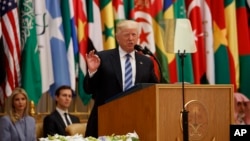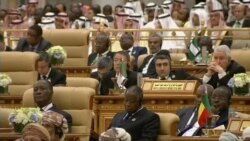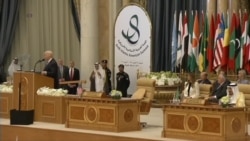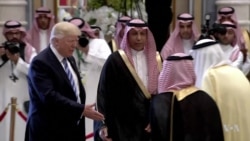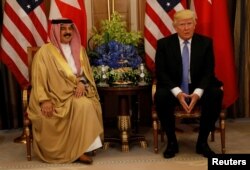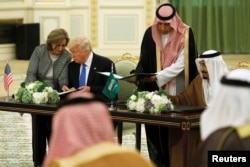U.S. President Donald Trump called Sunday for Muslim unity in the fight against terrorism, telling dozens of Arab and Muslim leaders at a regional summit in Riyadh it was "a battle between good and evil."
Trump, in his first overseas trip as president, said the U.S. wants a coalition of nations "who share the aim of stamping out extremism.
"This is not a battle between different faiths, different sects, or different civilizations," Trump said. "This is a battle between barbaric criminals who seek to obliterate human life, and decent people of all religions who seek to protect it."
WATCH: Trump Delivers Message of Friendship, Hope, Love
Trump, who is seeking to ban Muslims from six majority-Muslim countries where terrorist attacks have occurred from entering the U.S., did not use the contentious phrase "radical Islamic terrorism," as he frequently has in U.S. speeches. Instead, he called on the Muslim leaders to honestly confront "the crisis of Islamist extremism and the Islamist terror groups it inspires.
"Will we be indifferent in the presence of evil?" he asked.
Focus on Iran
Trump singled out Iran, accusing Tehran of contributing to instabililty in the region.
"From Lebanon to Iraq to Yemen, Iran funds, arms and trains terrorists, militias and other extremist groups that spread destruction and chaos across the region," Trump said.
Trump said battling terrorism "means standing together against the murder of innocent Muslims, the oppression of women, the persecution of Jews, and the slaughter of Christians. Religious leaders must make this absolutely clear: Barbarism will deliver you no glory — piety to evil will bring you no dignity."
'Not here to lecture'
He said, "America is a sovereign nation and our first priority is always the safety and security of our citizens. We are not here to lecture—we are not here to tell other people how to live, what to do, who to be, or how to worship. Instead, we are here to offer partnership – based on shared interests and values – to pursue a better future for us all. Every time a terrorist murders an innocent person, and falsely invokes the name of God, it should be an insult to every person of faith."
"Terrorism has spread across the world," Trump said. "But the path to peace begins right here, on this ancient soil, in this sacred land," stressing that "America is prepared to stand with you – in pursuit of shared interests and common security."
"United we cannot fail," he said.
The speech drew polite applause for about 20 seconds but there was no standing ovation except from the U.S. official delegation.
Jocelyne Cesari, who focuses on Islam and world politics at Georgetown University's Berkley Center for Religion, Peace and World Affairs, said the language used by Trump in his speech was a "clear departure from his domestic" remarks on Islam.
"He has never made this difference that he made in this speech between Islamist radical ideology and Islam as such... but what it will mean in terms of policy and implementation is not clear," she said.
Gulf Cooperation Council
Ahead of the speech, the U.S. president has been meeting with the six-nation Gulf Cooperation Council to discuss differences with Iran and how to deal with the country, and how to crack down on Islamic militancy.
Trump's speech is a surprising turn for the president in the wake of his “America First” rhetoric and campaign statements calling for a total Muslim travel ban, which he then softened to call for a more limited travel ban from the six Muslim-majority countries. His effort has been blocked by U.S. courts, although Trump is appealing the ruling.
Saudi Arabia is an unprecedented destination for an initial overseas visit by any U.S. president, but the oil-rich nation, which has deep, long-standing energy and defense ties to the United States, was not included in Trump's travel ban edict.
Earlier Sunday, on the second day of his two-day visit to Saudi Arabia, Trump held bilateral talks with the Arab leaders of Qatar, Bahrain, Egypt and Kuwait.
In talks with Bahrain's King Hamad Isa Al-Khalilfa, Trump said "Our countries have a wonderful relationship together, but there has been a little strain, but there won't be strain with this administration." The Trump administration decided this year to go ahead with the multi-billion-dollar sale of military jets and related equipment. The sale had been held up during the Obama administration by human rights concerns.
Trump accepted an invitation to visit Egypt during his meeting with Egyptian President Abdel Fattah el-Sissi. Trump said, "We will absolutely be putting that on the list very soon." Trump said there are "some very important talks going on with Egypt" and acknowledged the country's help with the release of U.S. aid worker Aya Hijazi, who had been held captive for three years.
Arms deals
On Saturday, Saudi King Salman bin Abdulaziz and Trump signed a nearly $110 billion agreement to bolster the military capabilities of Saudi Arabia.
The defense deal, effective immediately, was one of a series agreements the two countries signed to enhance their military and economic partnerships, including a second defense pact with options valued up to $350 billion over the next 10 years.
"It was a tremendous day," Trump said while meeting with Saudi Crown Prince Muhammad bin Nayef at a Riyadh hotel. "Jobs, jobs, jobs," the president said in a reference to the potential job creation opportunities the agreements provide.
The White House said in a statement earlier the defense deals will create new opportunities for U.S. companies in the Middle East region and support "tens of thousands" of new jobs in the U.S. defense industry.
The White House statement also said the deals will help both countries more effectively address common threats.
Included in the defense agreements is a $6 billion pledge to assemble 150 Lockheed Martin Blackhawk helicopters in Saudi Arabia, which is expected to result in the creation of 450 jobs in Saudi Arabia.
The military package also includes combat ships, tanks, missile defense systems, and cybersecurity technology.
Additionally, American conglomerate General Electric said Saturday it signed $15 billion in agreements with Saudi organizations. Saudi Aramco said it expected to sign $50 million in deals with U.S. companies in an attempt to diversify the kingdom's economy beyond oil exports.
VOA's William Gallo contributed to this report




